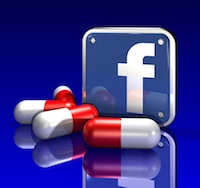
A new study gives potentially important information about social media use and why addiction to websites like Facebook is on the rise worldwide.
According to Dr. Cecilie Schou Andreassen of the University of Bergen in Norway, social media addiction is a distinct type of Internet addiction that has grown significantly over the past several years. Andreassen’s research provides a first-ever look at the demographics of the average addicted Facebook user.
According to Andreassen, Facebook addiction is much more common with younger users and women, both of whom respond to the social atmosphere of the website compared to real-life interactions. Her research also shows that socially insecure users are more likely to develop an addiction, as the website offers them a way to interact with their peers with less of a risk of perceived judgments. In contrast, organized people are less at risk for addiction and tend to use social networking websites as a tool to improve their professional lives rather than a complete source for socializing.
Andreassen’s group also attempted to define warning signs for Facebook addiction. The team’s research notes that addicts will feel a persistent need to check their Facebook profiles and may become uncomfortable or restless when denied the opportunity.
Facebook addiction also progresses over time. Addicts check the site more frequently and may start ignoring their responsibilities and avoiding real-life social situations in favor of social media. Severe Facebook addicts will notice their addiction negatively affecting their jobs and school coursework.
Andreassen surveyed 423 students to create the new Bergen Facebook Addiction Scale. Higher-scoring individuals have more severe symptoms or more symptoms than lower-scoring individuals. Andreassen hopes that the scale will provide psychologists and social media researchers with a logical way to assess social media addiction in individuals, ideally allowing for better research and more effective treatment options for addicts.
Members of her research group have also worked to develop other research instruments, including scales that measure work addiction. However, the Bergen Facebook Addiction Scale is the one of the first instruments specifically designed to measure social media addiction rather than Internet addiction, which is more generally defined.
I dislike the use of the term addiction for what I think is actually just a compulsion. Addiction implies many things not associated with a compulsion like an actual physical withdrawal. People can die from withdrawal from drugs, people have headaches and other physical symptoms of nicotine withdrawal, and similar reactions can be found for withdrawal from all sorts of addictions. People may have a hard time cutting back on Facebook and may have trouble putting down there smartphones but I do not think it reaches the level of addiction. If I take your Facebook account away from you I don’t think you will die.
What you’re describing is dependence. Addiction is different then physical dependence. People can be addicted to things besides chemicals. Examples are codependency, gambling addiction, sex addiction and so on. There are really only very few chemical withdrawals that can actually kill you. Alcohol withdrawal can kill you for instance, but cocaine withdrawal cannot.